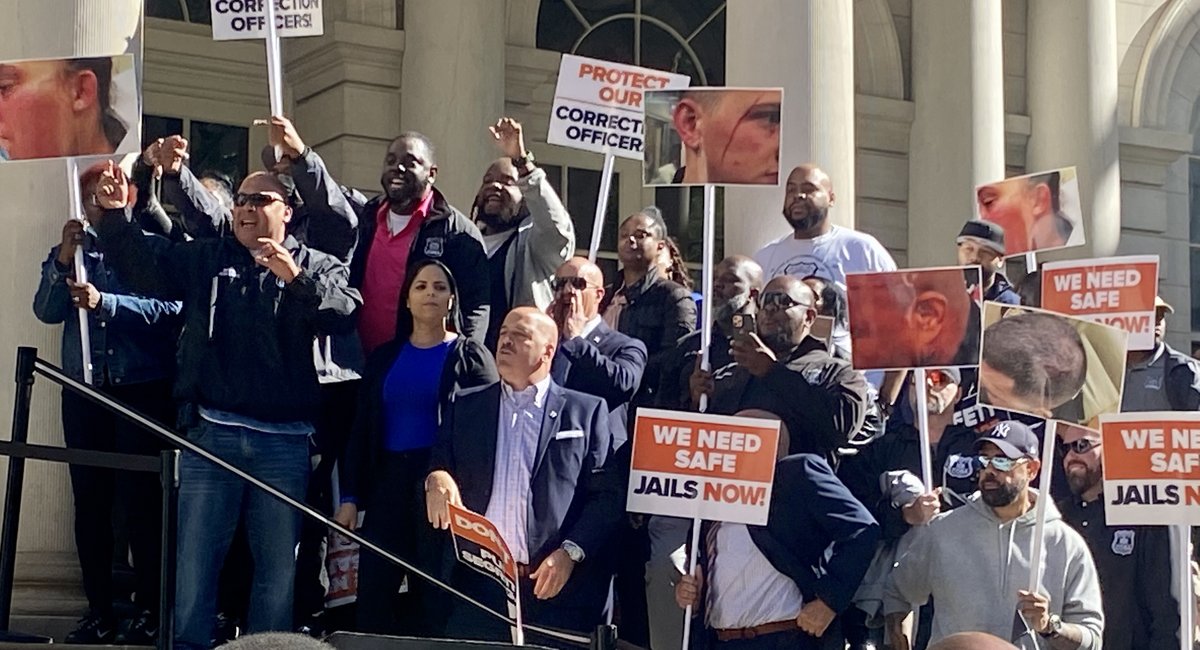A long-simmering controversy over solitary confinement at city jails came to the steps of City Hall on Wednesday with dueling, heated rallies that preceded a marathon hearing on the issue.
Corrections officers voiced their support for isolating dangerous detainees, while members of the City Council voiced support for a bill banning the practice. The two groups yelled chants at each other (“Safe jails now!” versus “End solitary now!”), and correction officers jeered at council members and gave the thumbs down signs.
Advocates spoke of incarcerated people indefinitely locked alone in cells or caged showers, resulting in extreme psychological trauma. They held signs with the names of those who recently died at Rikers Island, including several who died by suicide after being held in isolation. Family members of the deceased said officers failed to protect their loved ones.
The correction officers brought pictures of officers wounded in the line of duty, who had bloodied eyes and slash marks across their faces. Five of the seven correction officers who addressed the crowd were women who tearfully recounted being beaten and sexually assaulted by detainees. They described city jails as being filled with dangerous people, and argued that segregating such individuals keeps officers safe.
Keisha Williams, a vice president for the correction officers’ union, said she was sexually assaulted by an incarcerated person in 2016.
“Immediately, I felt violated, I felt ashamed, I felt humiliated, I was in a total state of shock, asking myself how did this happen to me, and why did this happen to me,” she said.
Williams said her assailant was never punished for what he did, while “I, on the other hand, am forced to relive the burden of that trauma every single day for the rest of my life.”
At the end of the rally, Councilmember Shahana Hanif told the crowd that correction officers protesting on the other side of the stairs into City Hall had threatened sexual violence against her.
Public Advocate Jumaane Williams, a sponsor of the bill, cited data showing that people held in solitary confinement conditions are more likely to die by suicide and suffer from substance abuse and homelessness.
“No one leaves solitary whole,” he said at the rally, amid heckling by correction officers.
After the rally, the City Council’s committee on criminal justice held a six-hour hearing, but no vote, on the bill. Correction Commissioner Louis Molina and city council members who support the bill disagreed on everything from the definition of solitary confinement to what the bill actually does.
“We do not have solitary confinement,” Molina said several times in his testimony. He described holding someone alone in a cell for 23 hours or more as inhumane, and he said everyone housed in Rikers jails gets at least seven hours out of their cells every day.
Yet, as Gothamist reported in July, there are unofficial forms of solitary confinement at Rikers Island. A Gothamist story published on Wednesday showed that an incarcerated individual was recently placed in a caged shower for nearly 24 hours; he was finally removed on a gurney after harming himself.
At the hearing, Councilmember Shekar Krishnan asked about pictures and video, also obtained by Gothamist, showing fire-singed security doors and flooded, trash-filled corridors in the restrictive housing unit used to hold detainees who violate the rules.
“That was the condition of the department I inherited,” Molina said in response.
The proposed bill allows incarcerated individuals to be held in isolation for four hours in order to de-escalate conflicts — not six hours, as the current policy states.
At that point, a hearing would have to be held with a legal representative for the detainee in order to determine if that person committed a serious violent act. If found guilty, the detainee would be placed in restrictive housing with 14 hours of out-of-cell time, double what is currently allowed.
Currently, Molina said, those in restrictive housing — about 100 detainees — are guaranteed hearings on their alleged offense within five days. He said the department is in the final stages of implementing a new form of restrictive housing, in compliance with guidance from the federal monitor who oversees Rikers Island, that would offer more robust programing for the incarcerated individuals.
The City Council’s proposed ban, Molina said, “would endanger every person in our custody.” He said the 2020 bail reform laws, which allowed many of those charged with nonviolent crimes to be released pending their court dates, actually increased the percentage of “violent criminals” in custody.
That, he said, is a reason why Rikers has gotten more violent. Stabbings, slashings, and serious injuries have skyrocketed over the last year.
